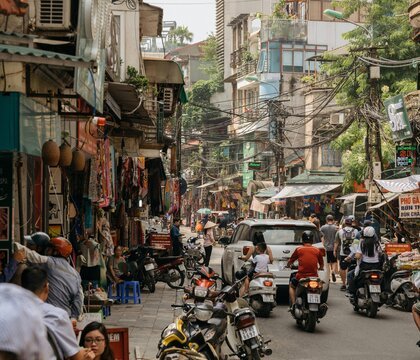Moving to Asia - a complete guide
Moving to Asia can be an exciting and transformative experience, given the diverse cultures, languages, and lifestyles across the continent. Whether you're relocating for work, education, or adventure, here's a guide to help you prepare for your move to Asia.
Preparing your move to Asia
Moving to a different part of the world can be challenging, but by preparing your international move as good as possible, you will be able to adapt to your new way of life faster. Make sure to learn about the cultural norms, traditions, and etiquette of the specific country you're moving to. Also language is an important part of moving internationally: Familiarize yourself with the local language to adapt faster. While English is widely spoken in many places, knowing some local phrases can enhance your experience. Check if any vaccinations or health screenings are required for entry.
Prepare your documentation for Asia
When moving abroad, you will have to take regulations and documentation into account. Investigate visa requirements for your destination country. Ensure your passport has sufficient validity and make copies of important documents.Below, we will provide more information for moving to different Asian countries.
It is critical to submit the visa application for your destination country in advance and keep track of the stipulations attached to your visa. Some countries may be flexible, others may have specific categories of visas. If you change employers while living overseas, you may need a new visa or face penalties. Double check all of this prior to relocating.
Find housing options in Asia
To make you feel at home straight away, it is important to have a place to stay at your destination, at least for the first few weeks. Explore housing options and neighborhoods. Consider proximity to work, schools, and amenities. If possible, secure temporary accommodation before arriving.
You will find staggering differences in various regions across Asia. Tokyo, Hong Kong, Shanghai, and Singapore will be comparable to San Francisco or London in terms of cost of living. Other regions will have small towns with decent housing for a fraction of the cost of a major metropolitan area. Housing standards will vary significantly as well. In addition, prior to purchasing a home in an Asian country, carefully research any restrictions or laws pertaining to a foreigner buying real property. Some countries may prohibit you taking full ownership, and some do not recognize private property rights at all, while others may allow foreigners to lease land.
Financial preparations for your move
The first few weeks you will have a lot to arrange as soon as you arrive. Banking and finances are one of these: Set up local bank accounts and understand the currency. Do not forget to notify your home bank about your move and inquire about international transaction fees.
Local taxes in Asia
Always check with a professional tax attorney or CPA, but in general Americans must still file federal tax returns. You may be able to deduct local taxes paid; however, if you maintain any connections to your home U.S. state, such as a bank account or renting out your home, you may be required to file state taxes. In addition, if you maintain over $10,000 in a foreign bank account, you will need to report that as well.

Working in Asia as a foreigner
Asian countries with developed economies such as South Korea and Japan will have compensation structures comparable to the U.S. Less-developed economies may have much lower salaries. One crucial issue will be the language barrier. If you speak only English, you can get along fairly well in Thailand, but not in Japan. Take some time to research the subtle social cues of your new culture prior to moving there. This will help you avoid awkward employment situations caused by an apparent insensitivity to social more.
If you're planning to work in Asia, thoroughly explore the job market and opportunities in your field. Research industries that are thriving, skill demands, and potential salary ranges. Networking with professionals already established in the region can provide valuable insights and connections. Understanding the job market will help you make an informed decision and ensure financial stability.

Moving to different Asian countries
Asia is a vast continent with very diverse cultures, languages and lifestyles. Every Asian country has its charm, so moving to one of them equals a great experience.
Moving to Myanmar
Until 2011, the Government of Myanmar didn’t allow tourists to visit the country. But ever since that has changed, a lot of expats have been moving to Myanmar for work. Myanmar has a lot of opportunities for working professionals as well as foreign investors.
Moving to the Philippines
Finding a job in the Philippines is not easy. While some expats manage it, better employment opportunities is not why people move to this country.
Moving to Vietnam
Moving to Vietnam is an adventure for expats. Vietnam offers a huge potential for earnings as well as promises a good quality of life.
Moving to Thailand
Expats moving to Thailand are sure to be fascinated by the sparkling beaches, striking landscapes and the enigmatic culture of the country.Finding a job in cities other than Bangkok is a challenge for expats. This is the reason why Bangkok has the maximum number of expats in the country.
Moving to Singapore
Expats from several countries have settle down in Singapore. Which is why, settling in at Singapore isn’t very difficult for expats. Read more about moving to Singapore in this detailed destination guide

